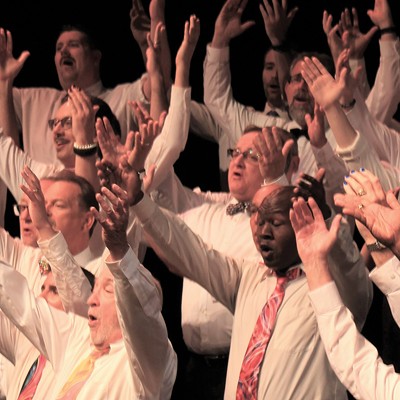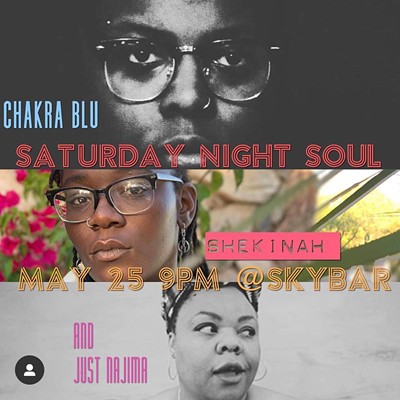The music of The Sword makes me feel as if I'm 13 years old again, and I mean that in the most complimentary way.
This band's brand of primal rock uses head-banging riffs to stir up the ooze of unsettled adolescent energy, melodic hooks to focus that energy, and songs of Nordic mythology and science fiction to fuel creative flights of imagination.
It's a combination of visceral release and engaging storytelling that encourages a still-developing mind—at least this one—to understand the potential for becoming something greater.
You could call The Sword's music retro, certainly, and there are elements in it that recall such great 1970s rock groups as Black Sabbath, Blue Öyster Cult, Thin Lizzy and perhaps a more metal-charged ZZ Top. And it's not as contemporary as the music of, say, Coldplay or Justin Bieber, but that's a good thing, right? The Sword make music that is timeless and classic.
The Sword will perform Wednesday, Nov. 16, at Club Congress, with local act Godhunter opening the show.
You could also tag The Sword with one of several other classifications: stoner rock, sludge or doom metal, none of which really describes the band's music. But guitarist and lead vocalist J.D. Cronise doesn't mind.
"At this point, people will call things what they will," he says via telephone. "If they call it a name that means something good to them, it's a compliment. If they call it a name that doesn't mean something good them, then it's a drag. I think you can tell how people feel about the band, and that is what's most important. People have their own ideas of what something sounds like, and I am not going to tell them it's this or it's that."
The Sword began as a series of demos that Cronise started work on in 2003. Soon, he had conscripted co-lead guitarist Kyle Shutt and bassist Bryan Richie, both of whom remain with the band. The band has employed a couple of different players behind the drum kit since the departure a year ago of original drummer Trivett Wingo.
"From the beginning, it was a distillation of everything we had done until that point. ... We've all been playing music since were kids. We're actually old farts who look younger than we are. We range in age from 27 to 35."
The group is from Austin, Texas, which many might consider a stronghold of country, blues and the folk singer-songwriter tradition. But in Austin, you can hear any kind of music. "That's true," Cronise says. "It's just that for blues and country and folk, there is a whole scene for each of them. With other styles of music in Austin, there might be just a few bands, such as ours."
Cronise says the first band that inspired him to make music was Led Zeppelin, which balanced the heavy with the delicate, leavening down-'n'-dirty moaning with esoteric lyricism.
The Sword made two albums, Age of Winters and Gods of the Earth, drawing from classic metal swords-and-sorcery topics. Songs from each of those albums—"Freya" from the former, and "The Black River" from the latter—were featured in different versions of the video game Guitar Hero, helping to raise The Sword's profile in the mainstream.
When making The Sword's third album, last year's sci-fi concept album Warp Riders, Cronise was inspired by another band—Queensrÿche.
In the band's bio, he says, "I'm pretty sure the first concept album I ever heard was Operation: Mindcrime when I was a kid, which I was way into. Even though I never really understood the whole story, I was nonetheless enthralled by how the album created its own world. I wanted to create a setting for our songs that would be unique and different, but still a place where epic sagas unfold in proper Sword fashion."
Among the source material that inspired Warp Riders was the legend of Atlantis, old Heavy Metal magazines, the films of René Laloux (perhaps best known for the trippy animated feature Fantastic Planet) and the Don Juan books by Carlos Castaneda, Cronise says.
Cronise also says that Warp Riders was born as the result of about two years of playing on the road with Metallica and their various supporting acts.
"We love Metallica. We played with them a lot, and every night, we would hear other bands on the tour, such as Lamb of God, Fear Factory and Machine Head, and those bands are great. But we started seeing how we wanted to go in a different direction, a less-extreme metal direction—an arena rock (direction), if you will, something more like a melodic rock album."
The Sword's three albums have been released by the independent label Kemado Records. That contract has finished, and Cronise says he's not sure how the band's next recording will be released.
Delivering music to the listener has become a tricky business, because—let's face it—a lot of younger listeners don't want to pay for their tunes anymore. This band is willing to consider every option.
"The business is changing. We are open to a lot of things. Who knows if people are still going to want to buy an album of eight to 10 songs in the future? Maybe making singles and EPs is the answer," Cronise says.
"I'm not married to the ideas of the past. Traditions tend to kind of impede progress and evolution rather than preserve anything sacred or special," he says. "We are all for positive change, and if that means finding a new, creative way to get music out, we want to explore that."
Cronise knows one thing: Playing concerts remains popular, and is still a necessary source of revenue for bands.
"The kids still want that intimate, emotional connection to live music, and we mean to provide it," he says.









